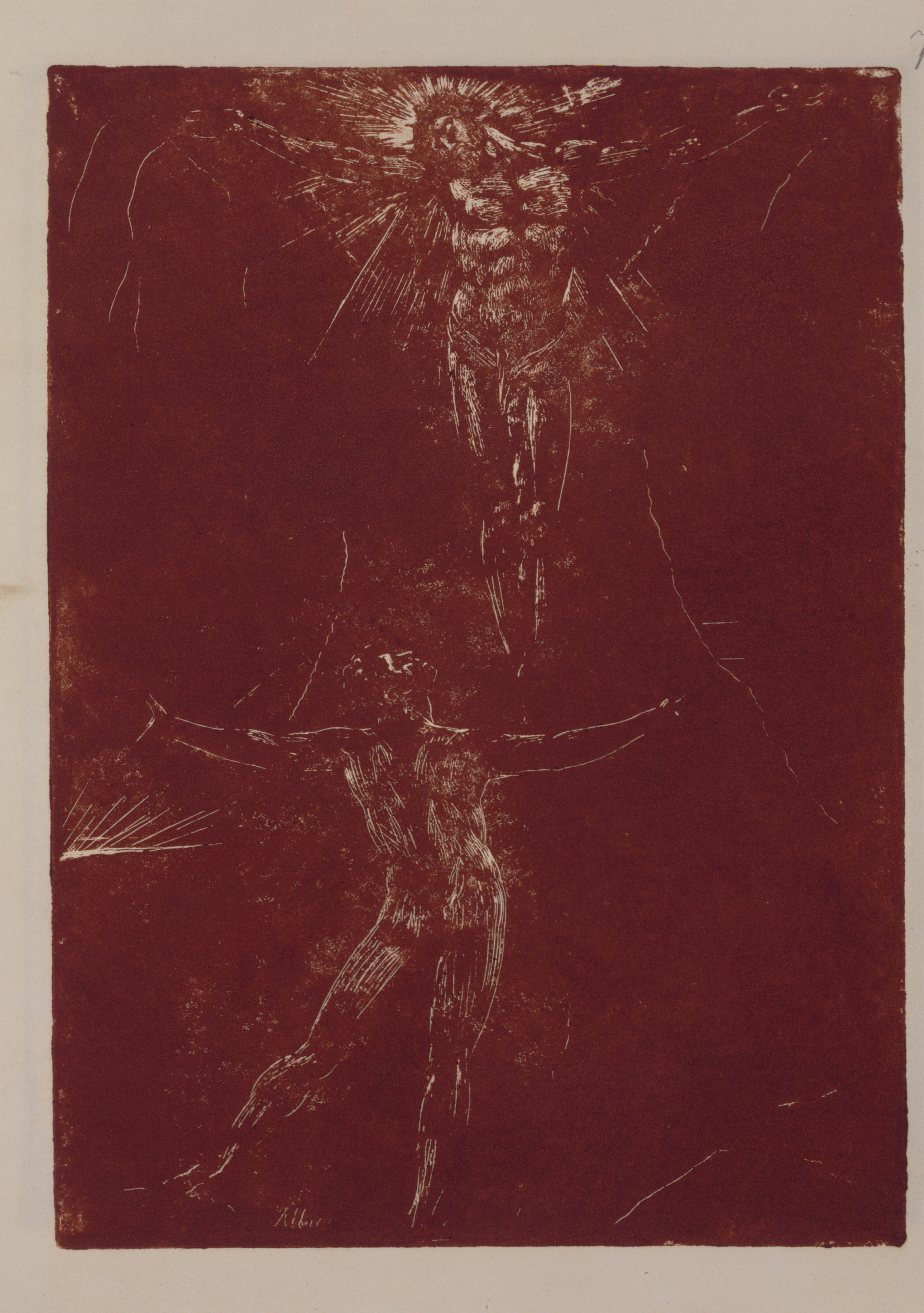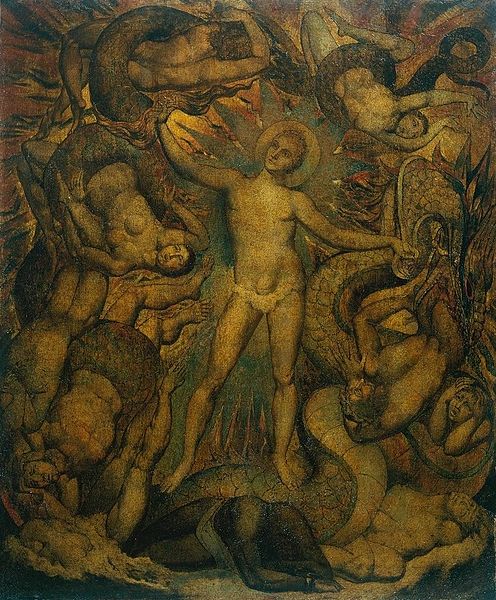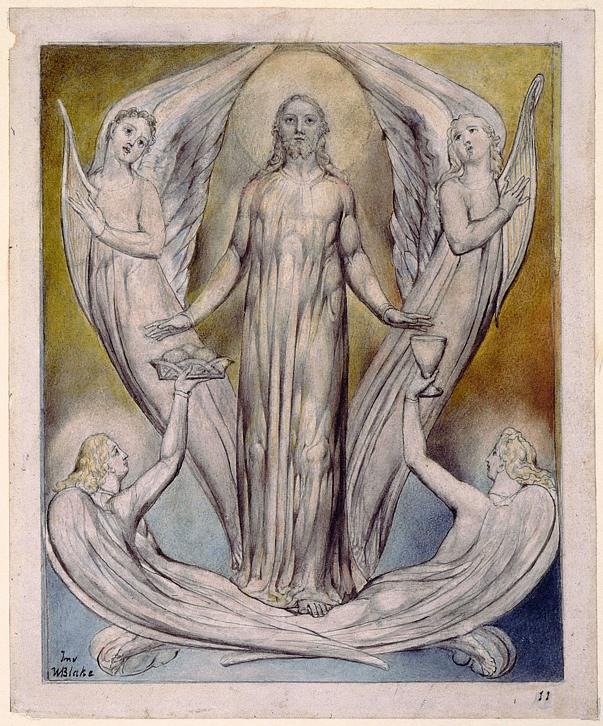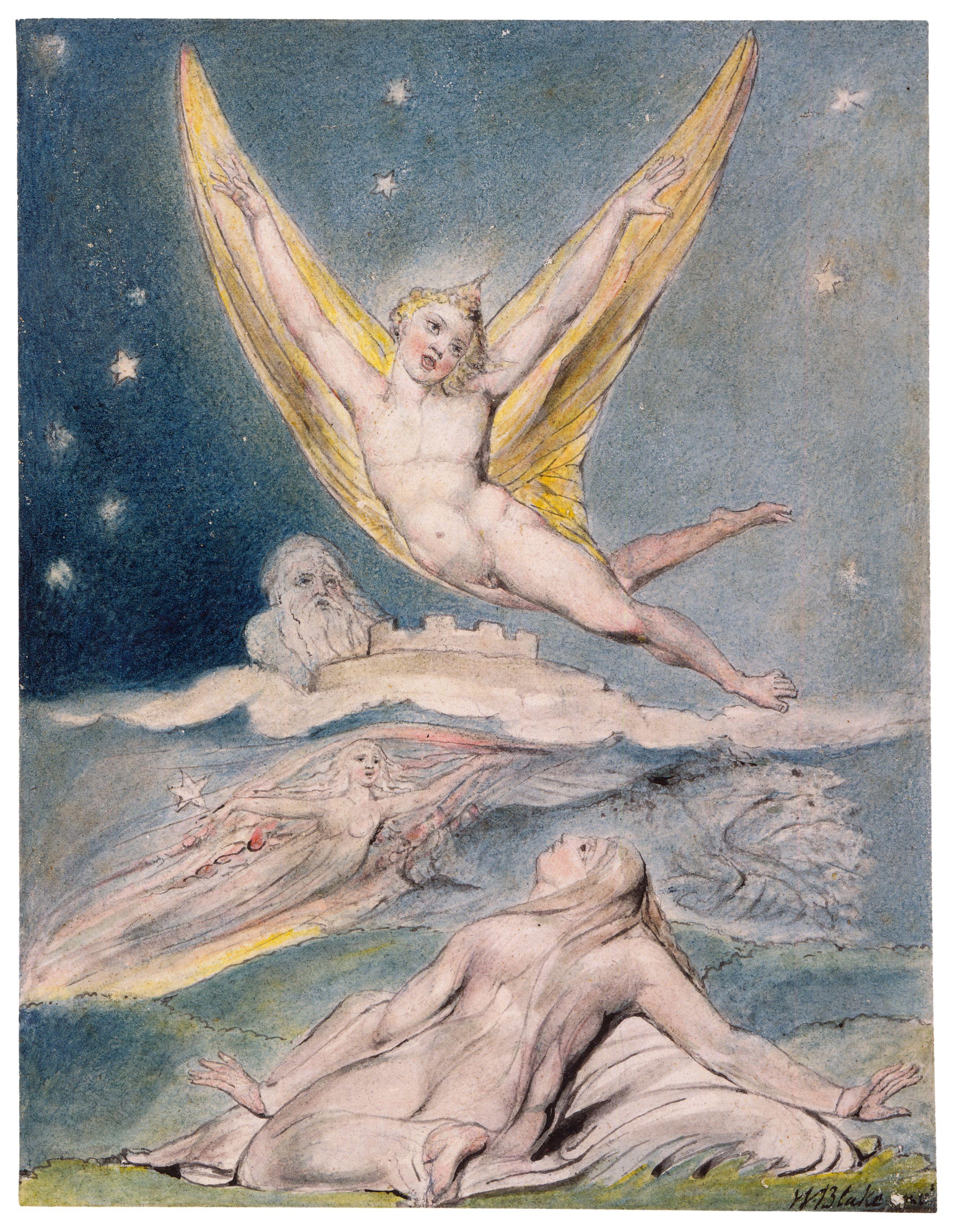Jerusalem, Plate 96 (E 255)
"As the Sun & Moon lead forward the Visions of Heaven & Earth
England who is Brittannia entered Albions bosom rejoicing
Then Jesus appeared standing by Albion as the Good Shepherd
By the lost Sheep that he hath found & Albion knew that it
Was the Lord the Universal Humanity, & Albion saw his Form
A Man. & they conversed as Man with Man, in Ages of Eternity
And the Divine Appearance was the likeness & similitude of Los
Albion said. O Lord what can I do! my Selfhood cruel
Marches against thee deceitful from Sinai & from Edom
Into the Wilderness of Judah to meet thee in his pride
I behold the Visions of my deadly Sleep of Six Thousand Years
Dazling around thy skirts like a Serpent of precious stones & gold
I know it is my Self. O my Divine Creator & Redeemer
Jesus replied Fear not Albion unless I die thou canst not live
But if I die I shall arise again & thou with me
This is Friendship & Brotherhood without it Man Is Not
So Jesus spoke! the Covering Cherub coming on in darkness
Overshadowd them & Jesus said Thus do Men in Eternity
One for another to put off by forgiveness, every sin
Albion replyd. Cannot Man exist without Mysterious
Offering of Self for Another, is this Friendship & Brotherhood
I see thee in the likeness & similitude of Los my Friend
Jesus said. Wouldest thou love one who never died
For thee or ever die for one who had not died for thee
And if God dieth not for Man & giveth not himself
Eternally for Man Man could not exist. for Man is Love:
As God is Love: every kindness to another is a little Death
In the Divine Image nor can Man exist but by Brotherhood
So saying. the Cloud overshadowing divided them asunder
Albion stood in terror: not for himself but for his Friend
Divine, & Self was lost in the contemplation of faith
And wonder at the Divine Mercy & at Los's sublime honour
Do I sleep amidst danger to Friends! O my Cities & Counties
Do you sleep! rouze up! rouze up. Eternal Death is abroad
So Albion spoke & threw himself into the Furnaces of affliction
All was a Vision, all a Dream: the Furnaces became
Fountains of Living Waters Howing from the Humanity Divine
And all the Cities of Albion rose from their Slumbers, and All
The Sons & Daughters of Albion on soft clouds Waking from Sleep
Soon all around remote the Heavens burnt with flaming fires
And Urizen & Luvah & Tharmas & Urthona arose into
Albions Bosom: Then Albion stood before Jesus in the Clouds
Of Heaven Fourfold among the Visions of God in Eternity"
The destination toward which mankind aspires is regeneration: being remade as a new being. His situation is that he cannot extricate himself from the trap of his own making for he has turned away from the Eternal dimension for which he was created. However when he discerns his own condition and knows there is a way out, he is ready to be released.
 |
Library of Congress
Jerusalem
Copy I, Plate 76
|
[51] Behold, I shew you a mystery; We shall not all sleep, but we shall all be changed,
[52] In a moment, in the twinkling of an eye, at the last trump: for the trumpet shall sound, and the dead shall be raised incorruptible, and we shall be changed.
[53] For this corruptible must put on incorruption, and this mortal must put on immortality.
[54] So when this corruptible shall have put on incorruption, and this mortal shall have put on immortality, then shall be brought to pass the saying that is written, Death is swallowed up in victory.
[55] O death, where is thy sting? O grave, where is thy victory?
[56] The sting of death is sin; and the strength of sin is the law.
[57] But thanks be to God, which giveth us the victory through our Lord Jesus Christ.
Writing of the freeing of the Redeemed from the error's power Milton Percival in William Blake's Circle of Destiny states:
"Though the burden of regeneration is placed upon Los and Enitharmon, the pivotal figure in the scheme is Christ. He is the only God, the divine humanity,the existence itself. When man lives through Urizen's 'beast-formed science' he is in non-existence. The change from non-existence to existence - the change from Satan to Christ - is accomplished when Enitharmon through pity weaves the generative body of Christianity for the Spectre. In so doing both she and Los comprehend that the peace of mankind is to be achieved through their own extinction. The prophetic race which preached the wrath of God will come to an end. The Christ, as seen in their sacrificial pity, has been achieved. Nonexistence has been exchanged for existence. The sexual world has become the generative world, and so a mortal world which passes out of existence that man may become immortal. Clothed in the habiliments of the Elect, the Redeemed, and the Reprobate, the newly 'created' cross the Arnon and pass out of Moab into Canaan, out of the kingdom of Satan into the kingdom of Christ. Albion begins to awaken upon his couch." (Page 231)
Romans 8 [J.B. Phillips translation]
8:1-2 - No condemnation now hangs over the head of those who are "in" Jesus Christ. For the new spiritual principle of life "in" Christ lifts me out of the old vicious circle of sin and death.
8:3-4 - The Law never succeeded in producing righteousness - the failure was always the weakness of human nature. But God has met this by sending his own Son Jesus Christ to live in that human nature which causes the trouble. And, while Christ was actually taking upon himself the sins of men, God condemned that sinful nature. So that we are able to meet the Law's requirements, so long as we are living no longer by the dictates of our sinful nature, but in obedience to the promptings of the Spirit.







